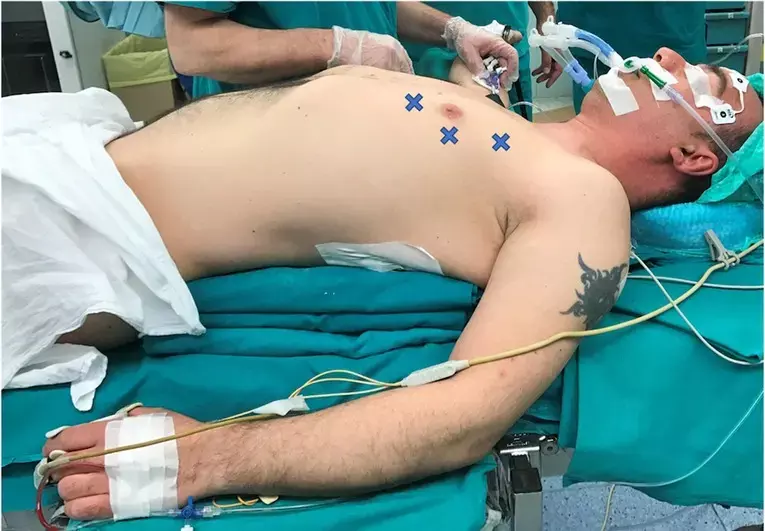- Home
- Medical news & Guidelines
- Anesthesiology
- Cardiology and CTVS
- Critical Care
- Dentistry
- Dermatology
- Diabetes and Endocrinology
- ENT
- Gastroenterology
- Medicine
- Nephrology
- Neurology
- Obstretics-Gynaecology
- Oncology
- Ophthalmology
- Orthopaedics
- Pediatrics-Neonatology
- Psychiatry
- Pulmonology
- Radiology
- Surgery
- Urology
- Laboratory Medicine
- Diet
- Nursing
- Paramedical
- Physiotherapy
- Health news
- Fact Check
- Bone Health Fact Check
- Brain Health Fact Check
- Cancer Related Fact Check
- Child Care Fact Check
- Dental and oral health fact check
- Diabetes and metabolic health fact check
- Diet and Nutrition Fact Check
- Eye and ENT Care Fact Check
- Fitness fact check
- Gut health fact check
- Heart health fact check
- Kidney health fact check
- Medical education fact check
- Men's health fact check
- Respiratory fact check
- Skin and hair care fact check
- Vaccine and Immunization fact check
- Women's health fact check
- AYUSH
- State News
- Andaman and Nicobar Islands
- Andhra Pradesh
- Arunachal Pradesh
- Assam
- Bihar
- Chandigarh
- Chattisgarh
- Dadra and Nagar Haveli
- Daman and Diu
- Delhi
- Goa
- Gujarat
- Haryana
- Himachal Pradesh
- Jammu & Kashmir
- Jharkhand
- Karnataka
- Kerala
- Ladakh
- Lakshadweep
- Madhya Pradesh
- Maharashtra
- Manipur
- Meghalaya
- Mizoram
- Nagaland
- Odisha
- Puducherry
- Punjab
- Rajasthan
- Sikkim
- Tamil Nadu
- Telangana
- Tripura
- Uttar Pradesh
- Uttrakhand
- West Bengal
- Medical Education
- Industry
RATS thymectomy safe and effective for large thymic epithelial tumors

RATS thymectomy is safe and effective treatment option for large thymic epithelial tumors suggests a new study published in the BMC Surgery.
Both video-assisted thoracoscopic surgery (VATS) thymectomy and robot-assisted thoracoscopic surgery (RATS) thymectomy have been suggested as technically sound approaches for early-stage thymic epithelial tumors. However, the choice of VATS or RATS thymectomy for large and advanced thymic epithelial tumors remains controversial. In this study, the perioperative outcomes of VATS and RATS thymectomy were compared in patients with large thymic epithelial tumors (size ≥5.0 cm).
A total of 113 patients with large thymic epithelial tumors who underwent minimally invasive surgery were included. Sixty-three patients underwent RATS, and 50 patients underwent VATS. Patient characteristics and perioperative variables were compared.
Results
Compared with the VATS group, the RATS group experienced a shorter operation time (median: 110 min vs.130 min; P < 0.001) and less blood loss (30.00 ml vs. 100.00 ml, P < 0.001). No patients in the RATS group needed conversion to open surgery, but in the VATS series, five patients required conversion to open procedures (0% vs. 14.29%, P = 0.054). The rate of concomitant resection in the RATS group was similar to that in the VATS group (11.43% vs. 5.71%; P = 0.673). There was no significant difference between the two groups in the duration of chest tube (P = 0.587), postoperative complications (P = 1.000), and the duration of postoperative hospital stay (P = 0.141).
For large thymic epithelial tumors, RATS thymectomy can be performed safely and effectively in a radical fashion. Due to the advanced optics and precise instrument control, concomitant resections can be easily achieved in larger thymic epithelial tumors using the robotic approach.
Reference:
Zhu, Lf., Zhang, Lm., Zuo, Cj. et al. Robot versus video-assisted thoracoscopic thymectomy for large thymic epithelial tumors: a propensity-matched analysis. BMC Surg 23, 330 (2023). https://doi.org/10.1186/s12893-023-02228-8
Keywords:
RATS, thymectomy, safe, effective, large, thymic, epithelial, tumors, BMC Surgery, Zhu, Lf., Zhang, Lm., Zuo, Cj
Dr. Shravani Dali has completed her BDS from Pravara institute of medical sciences, loni. Following which she extensively worked in the healthcare sector for 2+ years. She has been actively involved in writing blogs in field of health and wellness. Currently she is pursuing her Masters of public health-health administration from Tata institute of social sciences. She can be contacted at editorial@medicaldialogues.in.
Dr Kamal Kant Kohli-MBBS, DTCD- a chest specialist with more than 30 years of practice and a flair for writing clinical articles, Dr Kamal Kant Kohli joined Medical Dialogues as a Chief Editor of Medical News. Besides writing articles, as an editor, he proofreads and verifies all the medical content published on Medical Dialogues including those coming from journals, studies,medical conferences,guidelines etc. Email: drkohli@medicaldialogues.in. Contact no. 011-43720751


